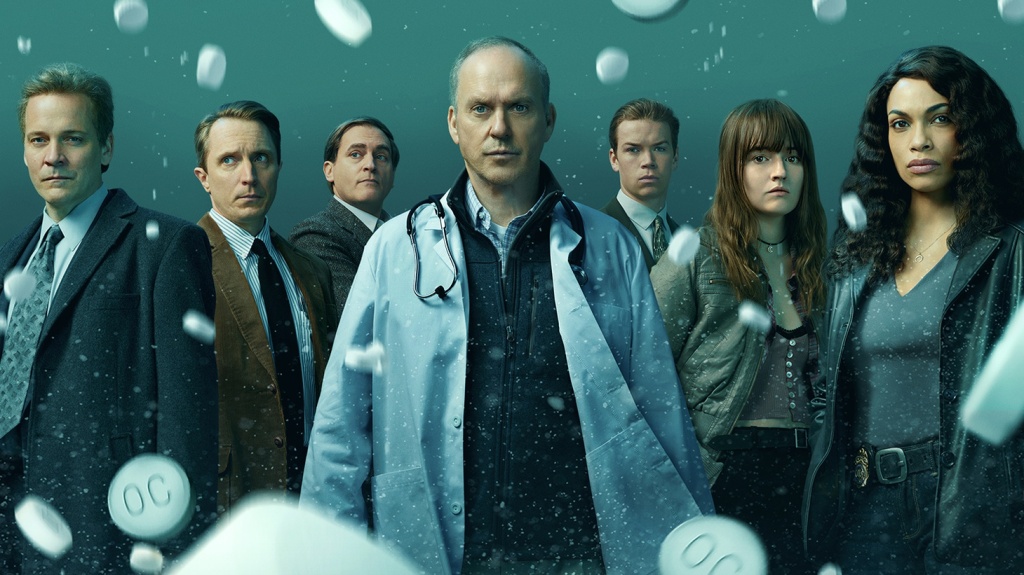
CAUTION–SPOLIERS ABOUND
One of the best series I’ve seen in a long time is Hulu’s “Dopesick,” based on the book of the same name by Beth Macy. It explores the many aspects of the opiod crisis, specifically the creation, marketing, prescribing and effect of Purdue Pharma’s OxyContin on those who became addicted to it as well as their families, friends and communities. Fortunately Ms. Macy co-wrote the series with Danny Strong, who has gone from acting the hapless Jonathan in “Buffy the Vampire Slayer” to becoming an Emmy-winning writer and producer. He and Ms. Macy should dust off their respective mantles now, because more statuettes will probably be headed their way, courtesy of this show.
Just one caveat about this series: at times it will break your heart.
Shifting between the late 1990’s to the present day, “Dopesick” covers a wide spectrum: the activities at Purdue Pharma, both at the executive and marketing levels; the practice of a physician (Michael Keaton) in a mining community in western Virginia; the eventual addiction of an injured miner (Kaitlyn Dever) and its impact on her family; and the investigations into Purdue’s activities separately conducted by a DEA deputy director (Rosario Dawson) and a pair of dogged Assistant U.S. Attorneys (Peter Sarsgaard and John Hoogenakker).
No punches are pulled with respect to Purdue or the crisis it caused; we see all the half-truths, outright lies and evasions they used to promote OxyContin, not to mention the “grants” they made to hush the opposition and the jobs they offered to those regulators who were in a position to put the brakes on this drug. Was it cynicism or shrewd marketing that caused Purdue to focus on selling to areas like Appalachia? And when their newly hired expert opines that the issue is not addiction but under-prescribing for pain so that dosages should be doubled, your jaw may well drop. All of this of course resulted in billions of dollars in Purdue’s coffers. If the face of this tragedy, Purdue President Richard Sackler (played by Michael Stuhlbarg), had had a mustache, we might have seen him twirling it. But “Dopesick” makes it very clear that Purdue had a prime enabler in its corner—the F.D.A. which consistently minimized the risks of OxyContin, bought Purdue’s line that less than 1% of the drug’s users became addicted, and in fact approved that labelling for the product in an unprecedented move.
This is a very smart show, many scenes of which will stay in memory. When Peter Sargaard’s character rallies his employees to keep digging for evidence against Purdue, you can’t help but flash back to scenes of that company’s marketing director revving up his sales force by offering trips to Bermuda to the rep who produces the highest dollar volume in sales. When Rosario Dawson’s DEA character, overcome with victory after scoring points against Purdue at a meeting, screams into a ladies’ room mirror, “I’ve got you now, motherf****ers!,” you cheer. But the down sides are many. It’s very difficult watching Michael Keaton’s character get hooked on OxyContin after being injured in a car accident, but even worse, seeing him steal drugs from his own patients. By the time he gets clean and pursues therapy, his guilt over prescribing the drug is overwhelming.
But the story that resonates the most belongs to young Betsy. Prescribed OxyContin to cope with the pain of a back injury she sustained in a mining accident, she soon becomes addicted. The worst follows in short order: she’s so stoned at work that she causes a serious accident and is fired; she loses her girlfriend; she steals her mother’s jewelry to hock it for drug money; she trades sex for drugs. Her religious parents (in tremendous performances by Mare Winningham and Ray McKinnon), who had previously thrown her out of the house for admitting she was gay, do a complete reversal by inviting her now ex-girlfriend to participate in an intervention; her strict father tearfully tells her “We just want you to get well.” Would that it were so.
There’s very little to fault in “Dopesick.” The performances are uniformly excellent, and the story merits its eight episodes. I highly recommend it.
